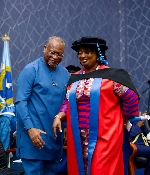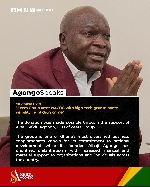Beyond A and B schools: Addressing educational inequality through political reform
 Joseph Coffie Ahiabenu
Joseph Coffie Ahiabenu
In Ghana, the phrase “A school” vs “B school” shapes how students dream, how parents worry, and how opportunity is unconsciously rationed. This unofficial ranking system goes beyond prestige.
It reflects deep inequalities in access to quality education, driven by political and resource disparities.
In a country where education is constitutionally declared a right, the persistence of such inequities challenges our collective commitment to fairness.
Free SHS expanded access, but access without equity risks widening hidden gaps.
Students in well-resourced “A schools” benefit from qualified teachers, functional laboratories, digital tools, and better support systems. Meanwhile, many students in rural or less-endowed schools face overcrowded classrooms, insufficient resources, and learning environments that make success a
battle rather than a pathway. Equality in policy means little when equity in opportunity remains unrealised.
School inequality is not accidental; it is political — Budget allocations, development priorities, and investment patterns determine which schools thrive and which are left in survival mode.
Development communication reminds us that transforming systems requires inclusive dialogue, community participation, and accountability in educational policy decisions.
Educational equity must be seen not as charity, but as justice. Rather than idolising elite schools, Ghana must prioritise upgrading less-resourced ones.
This includes fair teacher distribution, targeted infrastructure development, holistic training, and feedback systems that monitor learning outcomes beyond enrollment statistics.
If we continue to rank schools instead of raising standards across all schools, we risk turning education into a social lottery instead of a national equaliser.
SDG 4 and Ghana’s Constitution demand inclusive, equitable, quality education.
To honour these commitments, political reform must be bold, intentional, and people-centred.
The call to action is clear: Government must prioritise equitable policy reform; school administrators must promote inclusive excellence; parents and communities must support local schools and demand accountability; students must believe that their potential is not defined by school labels but by equitable systems that empower every learner.
Free SHS opened the door. Equity must ensure everyone walks through it with dignity.
-Joseph Coffie Ahiabenu|Development Communicator & Educationist.
Source: Classfmonline.com
Trending News

Vice President calls for stronger African agency in peace and security at KAIPTC’s 14th graduation ceremony
04:45
OSP to prosecute former Finance Minister, 5 others over SML contract scandal
19:33
Bola Ray clarifies Qnet’s role in alleged fraudulent cases
15:20
Teshie-Nungua Desalination Plant shutdown temporarily
15:47
Bryan beats Ken & Bawumia in Ashanti and Eastern - Global InfoAnalytics
13:44
Ghana is leading in youth empowerment efforts – Edem Agbana touts at BRICS forum
05:35
Weija MCE assists Chinese investors to encroach on Panbros Salt Factory lands
18:19
John Jinapor calls for strong partnerships to accelerate Africa’s solar transition
14:06
Paul Adom-Otchere challenges OSP’s asset declaration directive in court
15:37
Zeera Group arms NACOC with high-tech gear to boost visibility, fight drug crime
07:57



